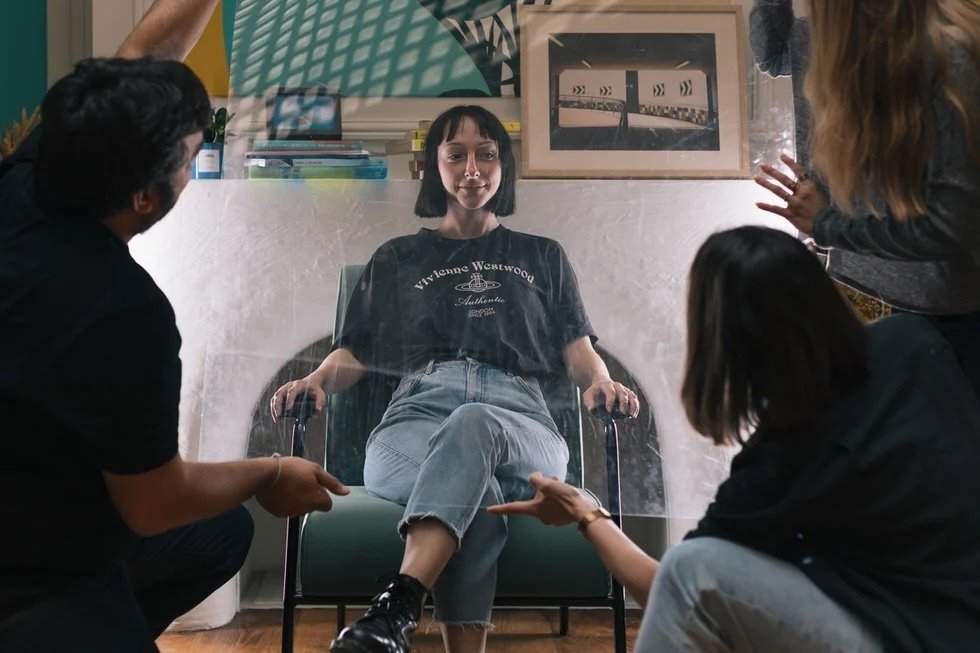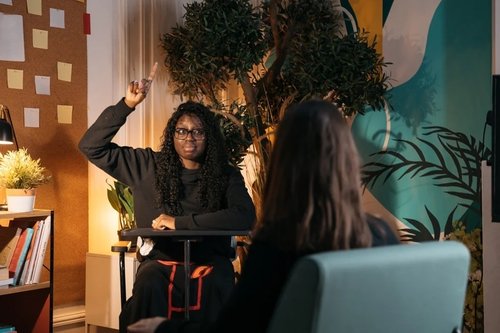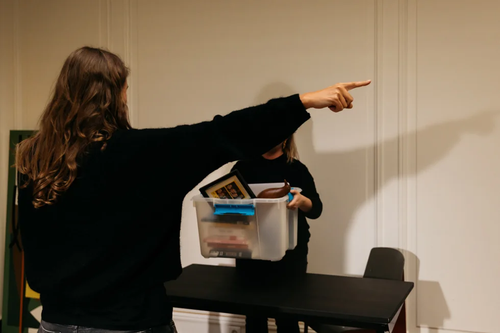4 candidates on humiliating interview questions they didn't see coming
May 05, 2022 - updated Jun 25, 2024
5 mins


US Editor at Welcome to the Jungle
For most of us, the interview process is daunting at best. We try our best to perfect and practice our elevator pitches and the typical HR questions: “Tell me about yourself.”, “What are your greatest strengths and weaknesses?”, “Where do you see yourself in 5 years?” We even do extensive research to make sure we can answer any uncommon questions thrown our way. But what happens when you get a question coming from left field? What about a question that is very inappropriate or even illegal? We have compiled a few inappropriate questions that people have endured during this already tumultuous process, along with how they handled the situation. Try not to get too offended.
“Can you show us your [20-year-old] undergrad transcripts?” Zach - Boston, Massachusetts
I have a Ph.D. and six years of experience in life sciences and had the opportunity to interview with a consulting firm in Boston in that industry. At first, when I was asked for my undergraduate transcripts, I thought it was a standard procedure for them to verify my academic background and graduation status. It felt like a strange request, but not an entirely unreasonable one. But when the person I was interviewing (who was several years my professional junior) brought up my grades, I was fairly dismayed. A fleeting moment of panic came over me when I was first presented with the question, feeling like I was being brought back to my graduate school application experience when my undergraduate grades did matter. But after a moment’s reflection, coupled with the realization that I was actually more experienced and qualified than the person interviewing me, I felt angry rather than worried.
To me, this kind of question showed that the company was not clear on their ideal candidate or even how to screen for suitable candidates. While I ignored the advice of some of my peers telling me to withdraw my application, I was ultimately rejected from the role for not having a “sufficiently competitive resume.” There’s a lot of ink spilled over the Great Resignation and how no one wants to work, but having interviewed with over 20 companies in the last six months, I was floored at how poorly a lot of HR processes are set up.
“Are you sure you can physically handle this position?” Jessica* - North Platte, Nebraska
I went for an interview at my local hospital after I had been volunteering there for years. The interview was with both the big boss and one of the more respected people I’d be working with. There was an application form to fill out where one of the questions asked if I could perform all the duties, and I checked yes. I am disabled and have a limp, but I can do almost everything fine. As I walked towards my interviews, they eyed my leg, but I didn’t find that unusual. It’s not deformed, but the limp is evident. I thought the interview went well, but towards the end of the interview, they asked, “And you’re sure you can physically handle this position?” At first, I was insulted. But I’m good at smoothing over people’s concerns, so I cheerily replied, “Oh, definitely! No problem.”
I didn’t think about it for a long time after. I was 19 when it happened and I didn’t even think about it not being appropriate. It’s a smaller town and I was very used to people treating me differently. I got the job and at work, they treated me like I was handicapped the entire time I held the position—I hated it. But, there was a very high turnover in that role; most people left after only six months. I made it to 9 months before I bailed. I didn’t think about how awful all of that was until recently when I started following topics related to work reform and the future of work, and it was then that I realized I had been a victim of discrimination.
“Okay great, so you like to drink, right?” Paige - Brooklyn, New York
I followed my heart and moved to Brooklyn from Arizona without having a job lined up. I had enough savings to get by for a few months, but ultimately was interviewing wherever I could. I got a call from a recruitment agency in Manhattan and the first interview went well so I moved forward in their hiring process. I was told more about the role in the second interview, emphasizing the company culture and the “work hard, play hard” attitude. While the interviewer and I were bantering back and forth, he said, “Okay great, so you like to drink, right?” After I answered, he wrote my answer down. In the moment, I didn’t think it was particularly strange that he asked the question but I did find it weird that he wrote my answer down as if saying no would mean I didn’t get the job.
I accepted the job and was placed as one of two female consultants on a team of several, mostly white, men with a boss who was also a white man. I was hit on the first day and regularly found myself the target of sexist jokes and remarks. At company happy hours (every Friday night), it was encouraged to drink … a lot. It was also encouraged to start drinking in the office early on Friday to get ready for happy hour. I worked there for around a year and I was miserable for most of it. I witnessed daily acts of sexism, homophobia, racism, and everything that should no longer be, and I quit after my boss told me to get with the culture or get out.
“How do we know you won’t commit any more crimes?” Shannon - Lowell, Florida
I am an ex-con with a criminal record. I have always made that clear when applying for jobs and do not hide it in my applications. I was accepted for an interview for an administrative office position where they clearly stated in the job advertisement that they “welcome ex-cons.” The humiliation came well before the interview even started. When I showed up, they asked my name and then exclaimed, “Oh! You’re the ex-con!” loud enough for the other applicants and staff to quickly turn around and stare at me as if I was an alien or worse. I was instructed to sit down apart from the other applicants, and when I asked why I was told, “Madam, we need to ensure the safety of all our applicants, so we prefer that you sit away from them.” My crime was victimless and non-violent, but I was desperate for a job so I stayed quiet.
After this already humiliating situation, I was called for the interview, which consisted of a panel of four people plus three HR interns who were there for an “observation.” I felt like a lab rat and that they were only there to experience “the ex-con.” Before even asking me about my skills and experiences, they asked the humiliating questions, “How do we know you won’t commit any more crimes?” and, “Why did you commit the crime in the first place?” After this near-interrogation, one of the panelists said, “Wow, this is the first time I’ve spoken to someone who has been to prison!” to which the other responded, “I know, right? I mean, she seems so normal. She’s shorter than my wife!” I was stunned and mortified. A couple of days later I got an automatic rejection email saying I was “not the right fit for the company,” because, of course, they couldn’t say “because you are an ex-con.”
These stories shed light on a range of inappropriate questions to be aware of during your interviews. Remember to stick to your beliefs and steer clear of companies whose morals don’t match yours. It could seem insignificant, but if you are uncomfortable or have a bad feeling during the interview, then it might not be the best work environment for you to thrive and succeed in. Use these humiliating experiences to your advantage and learn how to find the right fit for you.
Names changed for anonymity
Photo: Welcome to the Jungle
Follow Welcome to the Jungle on Facebook on LinkedIn and on Instagram and subscribe to our newsletter to get our latest articles every day!

More inspiration: Navigating challenging interview questions
Prepare for your next interview with our extensive guide on how to navigate challenging questions, protect your rights, and present yourself confidently, even in the face of unexpected inquiries.

Be ready for anything: How to handle unexpected interview questions
No one likes being caught off guard, but there are ways to avoid long silences and drawing blanks.
Mar 08, 2023

Easing the exit: A guide to articulating your career change in an interview
While you may be tempted to rant about a toxic workplace, letting a recruiter know why you're leaving your current role should be handled with care.
Feb 13, 2023

Protect your rights: Navigating illegal job interview questions
Whether intended or not, there could come a time when you find yourself faced with an illegal question in an interview. Here's what to look out for.
Jan 31, 2023

Should you talk about burnout in a job interview?
Talking about mental health in a job interview can be tricky. We look at if and how you should go about discussing burnout with an interviewer.
Oct 10, 2022

The layoff taboo: How to talk about it in an interview
Whether you were let go as part of a mass layoff or your performance just wasn't up to scratch, you'll probably have to talk about it at some point.
Sep 28, 2022
The newsletter that does the job
Want to keep up with the latest articles? Twice a week you can receive stories, jobs, and tips in your inbox.

Looking for your next job?
Over 200,000 people have found a job with Welcome to the Jungle.
Explore jobs